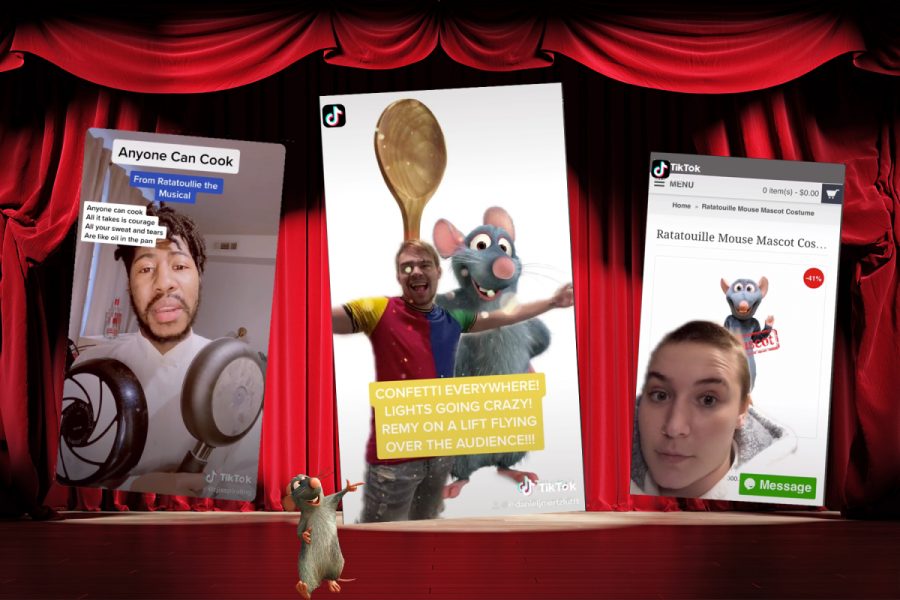Taste Testing “Ratatouille: The TikTok Musical”
A DELECTABLE TREAT: Creators all across TikTok rallied together to create a virtual live-action musical adaptation of the animated Pixar movie “Ratatouille,” surpassing the physical barriers imposed by the COVID-19 pandemic.
January 26, 2021
Not everyone can become a great artist, but a great artist can come from anywhere. Nowhere is this more true than in the newly-released “Ratatouille: The TikTok Musical,” a crowd-sourced live-action musical that stars Tituss Bergess (Remy), Andrew Barth Feldman (Alfredo Linguini) and Ashley Park (Colette Tatou) among others.
Based on the 2007 Pixar film “Ratatouille,” the show follows the story of Remy the rat, who dreams of becoming a famous chef. After being separated from his clan, Remy soon encounters Linguini, a garbage boy at Gusteau’s Restaurant. Taking inspiration from his idol, Auguste Gusteau, Remy forms a formidable duo with Linguini as they attempt to navigate the cooking landscape of Paris together, all while Linguini receives instruction from the reluctant female chef Colette and dodges the suspicions of head chef Skinner.
The musical began as a collection of songs and dances created by different TikTok users during the COVID-19 pandemic. By December of 2020, Seaview Productions had announced the creation of a concert version of the musical, with all ticket proceeds going to The Actors Fund. The show raised over $1.9 million.
Of the many innovative aspects of the musical, the rich and playful score stood out as the crème de la crème. Phenomenal orchestrations from the Broadway Sinfonietta elevated the score from a TikTok remix to a Broadway-caliber musical, and the powerful vocals, especially that of Feldman and Park, were reminiscent of the quality of in-theater performances. “Kitchen Tango,” featuring Linguini and Colette, was notable for its rapid-fire dialogue and snappy, engaging tune. Skinner’s “I Knew I Smelled a Rat” included a jazzy and sneaky melody, as well as a humorous tension brought by Skinner’s discovery that Remy was the real cook behind Linguini’s work. Despite the fact that the songs were pieced together from different creators, the musical score was surprisingly cohesive and embraced an overarching spirit of eccentricity and joyfulness.
However, in between the captivating music and dance breaks, the plot of the 40-minute-long musical was underdeveloped and rushed. Viewers are left with only a brief narration meant to move the musical along, with the lines cut just long enough for us to understand where the scenes are heading but too short to fully look into each character. The writing barely touches upon the bumbling charm of Linguini and the grittiness of Remy that the film “Ratatouille” first captured.
As expected, the musical also lacked the professionalism and consistency of a regular Broadway production. Due to COVID-19 safety measures, scenes were filmed individually and pieced together over a green screen in an unimpressive manner. Some videos were even filmed directly through the TikTok app. Furthermore, costumes and makeup design varied heavily depending on the actor, and the simple green screen backdrop often failed to add depth to each scene. However, given the fact that all of production happened remotely during a global pandemic, viewers should be quick to forgive these flaws.
Regardless of the musical’s imperfections, its mere existence is an impressive feat already. Even through the numerous challenges of the COVID-19 pandemic on the theater community, creators took advantage of social media to continue cultivating their creativity while connecting with one another. The result was a masterpiece—albeit flawed—that will go down in history for its fresh, fun and collaborative spirit during a time that needed it the most. As Remy says, people “don’t just survive…they create.”


























































